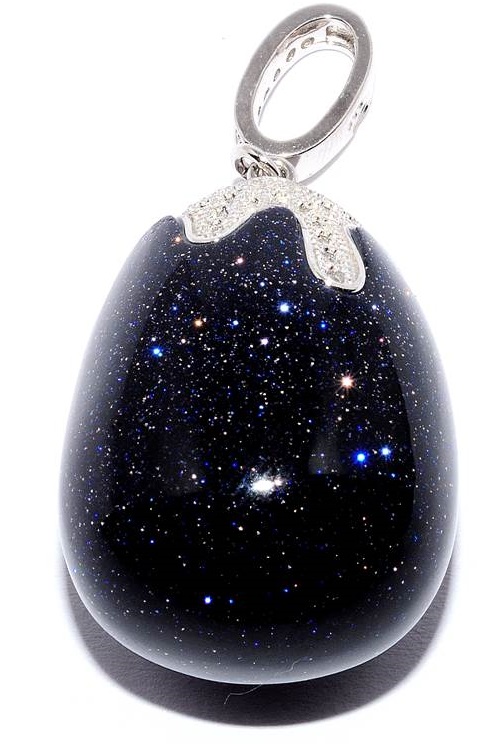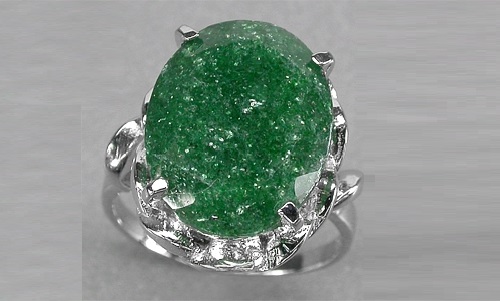Sparkling stars Aventurine
Sparkling stars Aventurine
Golden shimmer stone Aventurine (from Italian Avventura) is a fine-grained quartz of brown, gray, yellow, red, green and blue colors. The effect of glitter is due to the inclusion of small flakes of hematite, goethite or biotite. In the compounds of quartz are flakes that sparkle and play in the sun, bewitching its brilliance. Noteworthy, the color of aventurine inclusions depends on impurities. So, it can be yellow, brown, green, red, cherry, blue and even black. “The Night of Cairo” is a dark blue aventurine which looks like a dark blue southern sky, studded with stars.
Such countries as Brazil, India, USA, Spain, Austria, Australia, Chile, and Russia are rich with Aventurine fields. The name of Aventurine, also known as Goldstone, appeared at the beginning of the XVIII century.
There are several technologies for the production of sparkling glass, one of which was developed in St. Petersburg Institute of Technology in the late XIX century. Goldstone may also be of different colors – blue with the addition of cobalt oxides, green – with addition of chromium oxides, red-brown with the addition of copper or iron oxides.
But as for the stone itself, the color and texture of aventurine inclusions depends on the composition of various impurities, as well as grain size and uniformity of distribution. Therefore, green color stones are more durable, yellow – have the strongest sparkling, golden cherry – bright colors and intense shimmer, etc.
Aventurine has long been used for treatment. Oriental doctors offer it for therapeutic massage, assuring that it has a positive effect on the heart, eyes, calms the nervous system and has positive effects on hair making it thick and strong.
Sparkling stars Aventurine
The Geological Museum in London has a vase made of aventurine, donated by Nicholas II of Russia. From this beautiful stone jewelers made necklaces, brooches, bracelets, pendants and other jewelry, as well as vases, boxes, and table tops.
Aventurine loves not only the sun but also the light of the moon, so, at least, say astrologers, particularly blue Aventurine, reminiscent of the night star sky. Even the ancient physicians claimed that Aventurine responds for changing phases of the moon, and if you leave it at night by the light of the moon (on the sill), the stone “recharges” and intensify its healing properties.
What other properties Aventurine was endowed by ancient physicians? According to them, the stone sharpens emotions, sensuality, so it can be a source of inspiration for creative people. But what is valuable for one does not fit another. For example, those who run some responsible business, a stone can distract from work.
In China, Aventurine has been a popular stone. Here green aventurine was considered sacred, “imperial stone.” From it were cut the stamps for the emperor himself.
Aventurine is easy to polish, in jewelry it is cut as cabochons. Russian jewelers use the gem to make jewelry and vases, candle holders, handles for knives, forks, and manicure tools. The Hermitage keeps vases and tables from the Ural aventurine. Also, it exhibits a vase of aventurine height of 146 cm width 246 cm, and Pavlovsk Palace keeps a copy of the same material, but the height of 125 cm.
Sparkling stars Aventurine
According to Astrologers, Aventurine is one of the most powerful stones for its energy and recommended for those born under the particular Zodiac signs – Pisces, Cancer, Scorpio, Capricorn, Taurus, and Virgo. Also, aventurine is good for people born under the signs of Aquarius, Libra and Gemini. Noteworthy, astrologers do not recommend aventurine for such zodiac signs as Aries, Leo and Sagittarius.
If you trust the ancient astrologers and physicians, hurry to buy ornaments made of aventurine. And if you are confident in your own abilities, still buy – it is extraordinarily beautiful and not very expensive.

























